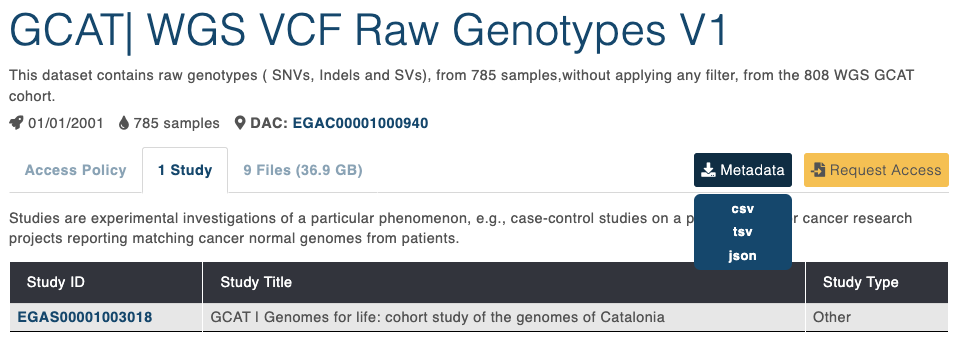Metadata Distribution
Welcome to the realm of Metadata Distribution within the EGA ecosystem!
Our Metadata REST API empowers you to effortlessly retrieve metadata from the expansive landscape of EGA. By utilising this API, you gain access to publicly available insights across various EGA domains, including studies, samples, experiments, runs, analyses, policies, DACs, and datasets. Furthermore, this API facilitates cross-referencing of objects, enabling you to gather, for example, all the datasets associated with a specific DAC, seamlessly.
In addition, we have added the ability to query private data using the metadata API. If you possess the necessary permissions, you can access behind-the-login private data for a specified list of datasets.
Identifiers
At the core of EGA's organisational structure are unique accessions that serve as essential tags for our diverse objects. Here's a quick overview of the accessions and their corresponding object types:
| EGA Accession ID | EGA Object description |
|---|---|
| EGAS | EGA Study Accession ID |
| EGAC | EGA DAC Accession ID |
| EGAP | EGA Policy Accession ID |
| EGAN | EGA Sample Accession ID |
| EGAR | EGA Run Accession ID |
| EGAX | EGA Experiment ID |
| EGAZ | EGA Analysis Accession ID |
| EGAD | EGA Dataset Accession ID |
| EGAB | EGA Submission ID |
| EGAF | EGA File Unique Accession ID |
For further information check our metadata schema documentation.
Dataset Mappings
For authorised datasets, comprehensive mappings reveal meaningful connections:
- Sample_file: This file presents information about the linkage between samples and files available in the dataset.
- Study_experiment_run_sample: This file presents information about the linkage between studies, experiments, runs, and samples within the dataset.
- Study_analysis_sample: This file presents information about the linkage between studies, analyses, and samples contained within the dataset.
- Run_sample: This file presents information about the linkage between runs and samples within the dataset.
- Analysis_sample: This file presents information about the linkage between analyses and samples within the dataset.
An empty file indicates the absence of corresponding information.
Website Download
Our website serves as your gateway to downloading metadata. Simply navigate to the dataset page, and you'll find a blue Metadata button. Once authenticated, you can click this button for authorised datasets. If you lack permissions for a particular dataset, request access by clicking the 'Request Access' button.

For authorised datasets, choose your preferred metadata format: CSV, TSV, or JSON.
Metadata API - Private
Leverage the power of programmatic metadata downloads! Start by authenticating yourself with your credentials to obtain an access token. With this token, programmatically query private information.
Queries mirror the structure of the Public Metadata API. However, behind the login, you can delve into specific mapping information (as mentioned above in dataset mappings) alongside object-level exploration.
Authentication
An active session is required to work with the API. Each time you log in with your credentials a new session is started, which is identified by an access_token. Below an example on how to obtain one using curl:
curl https://idp.ega-archive.org/realms/EGA/protocol/openid-connect/token \ -d 'client_id=metadata-api' \ -d 'username=...' \ --data-urlencode 'password=...' \ -d 'grant_type=password'
All responses from the API are in JSON format. A successful response should include a new token to be used for the session:
{"access_token":"eyJhbGciOiJSUzI1NiIsInR5cCIgOiA...TNw",
"expires_in":300,
"refresh_expires_in":1800,
"refresh_token":"eyJhbGciOiJIUzI1NiIsInR5cCIgOiA...pTX10",
"token_type":"Bearer",
...
}
Save the access_token value and include it in the API call headers.
Example query usage
Below you can find some example of queries available behing authentication and authorisation.
- Querying study-experiment-run-sample mappings:
curl https://metadata.ega-archive.org/datasets/{datasetID}/mappings/study_experiment_run_sample \
-H 'Authorization: Bearer access_token'
curl https://metadata.ega-archive.org/datasets/{datasetID}/mappings/run_sample \
-H 'Authorization: Bearer access_token'
curl https://metadata.ega-archive.org/datasets/{datasetID}/mappings/study_analysis_sample \
-H 'Authorization: Bearer access_token'
curl https://metadata.ega-archive.org/datasets/{datasetID}/mappings/analysis_sample \
-H 'Authorization: Bearer access_token'
curl https://metadata.ega-archive.org/datasets/{datasetID}/mappings/sample_file \
-H 'Authorization: Bearer access_token'
You can get a different output format by adding one of these options to the curl command:
-H 'Accept: text/tsv' -H 'Accept: application/json' -H 'Accept: text/csv'
For more detailed information, refer to the Metadata API Specification.
